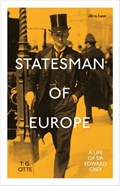'The lamps are going out all over Europe. We shall not see them lit again in our life-time.' The words of Sir Edward Grey, looking out from the windows of the Foreign Office at the end of August 1914, are amongst the most famous in European history, and encapsulate the impending end of the nineteenth-century world.
The man who spoke them was Britain's longest-ever serving Foreign Secretary (in a single span of office) and one of the great figures of late Victorian and Edwardian Britain. Statesman of Europe describes the three decades before the First World War through the prism of his biography, which is based almost entirely on archival sources and presents a detailed account of the main domestic and international events, and of the main personalities of the era. In particular, it presents a fresh understanding of the approach to war in the years and months before its outbreak, and Grey's role in the unfolding of events.
Yet Grey's life was not all public affairs, momentous as those were. He disliked being in London, much preferring country life at Fallodon, his family estate in Northumberland, and displayed none of the ambition of his contemporaries (or successors). He attended assiduously to his duties as director of the Great North Eastern Railway, one of the transformative enterprises in industry and communications of the period, and wanted to spend as much time as he could fishing. Apart from his memoirs, the only book he wrote was called The Charm of Birds. This hinterland gave quality to his judgements, and made his character attractive to his contemporaries.
This important book is the definitive biography of one of the pivotal figures in European diplomacy, and a magnificent portrait of an age.

